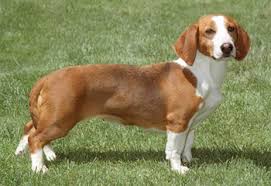
Drever
Conditions of detention
Drevers are adaptable dogs that can live in both rural and urban environments, provided they receive adequate exercise. They thrive in homes with a yard where they can explore and play but can also adapt to apartment living if they are given sufficient daily exercise.
Useful Fact: Drevers are happiest when they have a job to do, such as hunting or participating in dog sports, which helps satisfy their high energy levels and mental stimulation needs.
Nutrition and diet
A balanced diet is essential for the Drever’s overall health and well-being. High-quality dog food that meets their nutritional requirements, based on their age, size, and activity level, is recommended. Fresh water should always be available.
Useful Fact: Drevers can be prone to obesity, so it’s important to monitor their food intake and provide regular exercise to maintain a healthy weight.
Health
Drevers are generally healthy dogs, but like all breeds, they can be prone to certain health conditions. Common issues include hip dysplasia, back problems, and ear infections. Regular veterinary check-ups are crucial for maintaining their health.
Useful Fact: Keeping their ears clean and dry can help prevent ear infections, which are common in breeds with floppy ears.
Grooming and care
Drevers have a short, dense coat that is easy to care for. Regular brushing, about once a week, will help remove loose hair and keep their coat healthy. Their coat is typically tricolor or bicolor, with shades of black, white, and tan.
Useful Fact: Drevers shed moderately year-round, with heavier shedding occurring during seasonal changes.
Education and training
Drevers are intelligent and eager to please, making them relatively easy to train. They respond best to positive reinforcement methods, such as treats, praise, and play. Early training and socialization are essential to ensure they grow into well-behaved adults.
Useful Fact: Drevers excel in tracking and hunting activities due to their strong sense of smell and persistence.
Toys and entertainment
Drevers need plenty of mental and physical stimulation to keep them happy. Providing a variety of toys, such as chew toys, puzzle toys, and interactive games, can help prevent boredom.
Useful Fact: Engaging them in activities that mimic hunting, such as scent tracking games or fetch, can be particularly satisfying for this breed.
Safety
Drevers have strong hunting instincts, so it’s crucial to keep them in a secure, fenced area when outside. They should always be on a leash when not in a confined space to prevent them from wandering off in pursuit of small animals.
Useful Fact: Microchipping your Drever can help ensure they are returned to you if they ever get lost.
Accessories
Drevers benefit from durable accessories, including collars, leashes, and harnesses. Given their active nature, investing in high-quality gear is important for their safety and comfort.
Useful Fact: A sturdy, comfortable bed is essential for their rest and recovery after a day of activity
Socialization
Early and consistent socialization is key to developing a well-rounded Drever. Expose them to different people, environments, and other animals to ensure they grow up to be confident and well-mannered.
Useful Fact: Puppy classes can be an excellent way to start socialization and training in a controlled environment.
Travel and Transportation
Drevers are generally good travelers if they are introduced to it gradually and positively. They should be secured in a travel crate or with a dog seat belt harness when in a vehicle to ensure their safety.
Useful Fact: Frequent breaks during long trips are important to allow them to stretch, hydrate, and relieve themselves.
Behavior and psychology
Drevers are known for their loyalty, intelligence, and affectionate nature. They form strong bonds with their families and are excellent with children. They can be independent but are generally friendly and sociable dogs.
Useful Fact: Providing them with consistent routines and positive reinforcement helps to foster their sense of security and well-being.
Legal aspects
In some areas, owning a Drever may require registration with local authorities or kennel clubs. It’s important to be aware of and comply with any breed-specific legislation in your area.
Useful Fact: Keeping your dog’s vaccinations and licenses up to date is crucial for legal compliance and their health.


